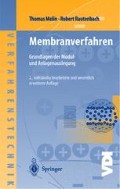Zusammenfassung
Mathematische Modelle sind für die Auslegung und Optimierung von Modulen und Prozessen erforderlich und gleichermaßen wichtig für einen wirtschaftlichen Vergleich eines Membranprozesses mit konventionellen Verfahren. Grundlage jeder Anlagenauslegung und Prozesssimulation sind die Erhaltungsgleichungen für Masse, Stoffart, Impuls und Energie. Diese müssen differentiell formuliert werden, da sich wesentliche Größen, wie Konzentrationen und Massenströme, bei der Pervaporation auch die Temperatur, entlang der Verfahrensstrecke (Membran) ändern.
Access this chapter
Tax calculation will be finalised at checkout
Purchases are for personal use only
Preview
Unable to display preview. Download preview PDF.
Literatur
Atkins PW (1990) Physikalische Chemie. VCH Verlag, Weinheim
Bakker JW (1998) Structured Systems in Gas Separation. PhD Thesis Delft University of Technology.
Bakker JW, Kapteijn F, Poppe J, Moulijn JA (1996) Permeation Characteristics of a Metal Supported Silicalite-1 Zeolite. Membrane. J Membr Sci 117
Bhave RR (1991) Inorganic Membranes. Van Nostrand Reinhold, New York
Bird RB, Stewart WE, Lightfoot EN (1960) Transport Phenomena. John Wiley & Sons, Inc, p 569 ff
Cussler EL (1997) Diffusion — Mass Transfer in Fluid Systems. 2. Ed Cambridge: p 180
Cussler EL, Aris R, Brown A (1998) On the Limits of Facilitated Diffusion. J Membrane Sci 43: 149
Fang SM, Stern SA (1975) A Free Volume Model of Permeation of Gas and Liquid Mixtures Through Polymeric Membranes. Chem Eng Sci 30: 773–780
Hauser J, Heintz A, Reinhardt GA, Schmittecker B, Wesslein M, Lichtenthaler RN (1987) Sorption, Diffusion and Pervaporation of Water/AlcoholMixtures in PVA-Membranes. Experimental Results and Theoretical Treatment. Second international Conference on Pervaporation Processes in the Chemical Industry. Bakish R (ed), Bakish Materials Corporation, Englewood, NJ
Henis JM, Tripodi M (1981) Composite Hollow Fiber Membranes for Gas Separation: The Resistance Model Approach. J Membr Sci 8: 223–246
Kerkhof PJ (1996) A modified Maxwell-Stefan model for transport through inert membranes: the binary friction model. The Chemical Engineering Journal 64: 319–343
Lee WM (1980) Selection of Barrier Materials from Molecular Structure. Polym Eng Sci 20:60 ff
Lohscheidt M (1999) Neuronale Netze in einem Managementsystem der Membrantechnik. Shaker Verlag. Dissertation RWTH Aachen
Mason EA, Lonsdale HK (1993) Statistical-Mechanical Theory of Membrane Transport. J Membr Sci 51: 1–81
Mason EA, Malinauskas AP (1983) Gas transport in porous media: The Dusty-Gas-Model. Elsevier, Amsterdam
Meares P (1976) Membrane Separation Processes. Elsevier Scientific Publishing Company
Merten U (1966) Desalination by Reverse Osmosis. The MIT Press, Cambridge (MA )
Noack M, Kölsch P, Schäfer R (2002) Gastrennung an mikroporösen anorganischen Membranen. Vortrag im Rahmen „Trends in der Membrantechnik — Gastrennung mit Membranverfahren“ (29./30.04. 2002 ). FhG-IGB, Stuttgart
Paul DR, Ebra-Lima OM (1970) Pressure Induced Diffusion of Organic Liquids Through Highly Swollen Polymer Membranes. J Appl Polym Sci 14: 2201 ff
Schneider P (1978) Multicomponent isothermal diffusion and forced flow of gases in capilaries. Chem. Ing. Sci. 33: 1311–1319
Schramm 0 (1999) Zur Durchführung reversibler Reaktionen in Membranreaktoren. Dissertation. Otto-von-Guericke-Universität, Magdeburg
Seidel-Morgenstern A, Schramm O, Tuchlenski A (1998) Charakterisierung oberflächenaktiver Membranen und ihre Anwendung in der Membrantechnik. Dechema Jahrestagung, Kurzfassung Bd II: p 263
Sircar S, Waldron WE, Rao MB, Anand M (1999) Hydrogen Production by Hybrid SMR-PSA-SSF Membrane System. Sep & Purif Tech 17: 11–20
Struck A (1998) Untersuchung und Optimierung von Hohlfasermodulen für die Stickstoffanreicherung durch Gaspermeation. Dissertation, RWTH Aachen
Toshima N (1992) Polymers for Gas Separation. VCH publishers, New York
Vrentas JS, Duda JL (1977) Diffusion in Polymer-Solvent Systems — Reexamination of the Free-Volume Theory. J Polym Sci Polym Phys 15:403 ff
Wesselingh JA, Krishna R (2000) Mass Transfer in Multicomponent Mixtures. 1st ed.
Wessling M (1992) Relaxation Phenomena in Dense Gas Separation Membranes. PhD Thesis, Enschede, The Netherlands
Author information
Authors and Affiliations
Rights and permissions
Copyright information
© 2004 Springer-Verlag Berlin Heidelberg
About this chapter
Cite this chapter
Melin, T., Rautenbach, R. (2004). Modellierung des Stofftransportes in Membranen. In: Membranverfahren. VDI-Buch. Springer, Berlin, Heidelberg. https://doi.org/10.1007/978-3-662-08653-7_3
Download citation
DOI: https://doi.org/10.1007/978-3-662-08653-7_3
Publisher Name: Springer, Berlin, Heidelberg
Print ISBN: 978-3-662-08654-4
Online ISBN: 978-3-662-08653-7
eBook Packages: Springer Book Archive

